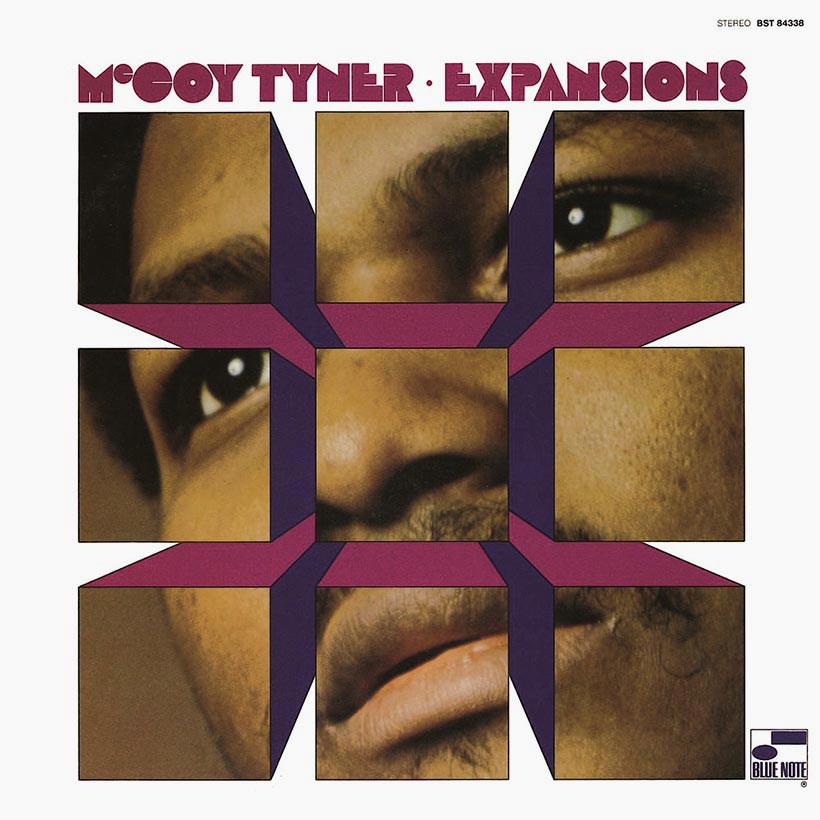Though still only 29 years old when he recorded Expansions for Blue Note Records at Van Gelder Studio, on Friday, August 23, 1968, Philadelphia pianist McCoy Tyner was nevertheless a seasoned and highly experienced musician.
Listen to McCoy Tyner’s Expansions now.
Tyner’s professional career began when he was just 15, playing in local R&B bands, but he soon outgrew them. Mentored by noted bebop pianist Bud Powell, who was a neighbor, the young Tyner rapidly blossomed into a major jazz talent. He first came onto the radar of the wider jazz public after he played in Benny Golson and Art Farmer’s groundbreaking band, The Jazztet, in 1959.
A year later, Tyner, then just 21, was recruited by rising star John Coltrane and, as part of the saxophonist’s famous quartet over the next five years, he would help to shape the course of jazz history via classic albums such as My Favorite Things, “Live” At The Village Vanguard and A Love Supreme.
Tyner’s solo career began while he was still with Coltrane and, in a fertile period between 1962 and 1964, he released six albums for the Impulse! label. After he left Coltrane, in 1965, Tyner had a couple of fallow years but eventually landed at Blue Note in 1967.
Expansions was his fourth LP for the iconic jazz label and its title referenced the fact that it was Tyner’s most ambitious solo project up to that point, using a larger ensemble than was the norm, comprising seven musicians. In terms of its personnel, Expansions certainly boasted an impressive line-up. On saxophone was Wayne Shorter, then still in the Miles Davis Quintet, while Ron Carter was also “borrowed” from that group, though he played cello on the session rather than his customary bass. Playing trumpet was one of Philadelphia’s rising talents, Woody Shaw, who had impressed on organist Larry Young’s 1966 Blue Note LP Unity. Playing alto sax (and doubling on wooden flute) was Baltimore musician Gary Bartz, who, later in the 70s, would go onto work with Miles Davis. Completing the line-up was bassist Herbie Lewis and drummer Freddie Waits.
Expansions’ opener, “Vision,” is a classic slice of late 60s modal jazz. A propulsive cut, it’s driven by Tyner’s percussive – and strongly rhythmic – piano chords. Above this jaunty ostinato pattern the horn players harmonize a clarion-like series of motifs, before a transition into a swinging bridge section with walking bass. Tyner takes the first solo, juxtaposing explosive left-hand chords with sparkling and fleet-of-finger right-hand runs. As the music simmers down, Ron Carter falls under the spotlight with a dexterous bowed cello solo that uses glissandi effects. He’s followed by blazing passages of improv by the horn players, Wayne Shorter, Gary Bartz, and Woody Shaw, though it’s drummer Freddie Waits who has the final say, with a short solo before a reprise of the main theme.
After the frenetic opener, the shimmering “Song Of Happiness” is serene by comparison. With its use of pentatonic scales, it has a pronounced East Asian influence, perhaps reflecting the fact that Tyner had visited there a year earlier.
“Smitty’s Place” is fast and furious, featuring a series of duels by members of the septet. The first finds Wayne Shorter jousting with Tyner; they’re followed by Shaw and Bartz, whose horns intertwine, and then, with the song’s fizzing momentum dissolving with the absence of drums, Ron Carter and Herb Lewis offer a dialogue between cello and bass. Freddie Waits re-enters to set up a musical conversation with Tyner.
Built on a loping, midtempo bass groove similar in feel to Horace Silver’s “Song For My Father” is the Latin-tinged “Peresina,” which shows that Tyner can play with delicacy as well as power and precision. In addition to providing elegantly blended horn parts, Shorter, Bartz, and Shaw also contribute fabulous individual solos.
The album’s closing song, a bittersweet ballad called “I Thought I’d Let You Know,” is more traditional in style and the only cover on Expansions. It comes from the pen of Cal Massey, a Philadelphia trumpeter who was better known for his songwriting ability (John Coltrane, Lee Morgan, Freddie Hubbard, and Archie Shepp were among the jazz musicians who recorded his songs).
I Thought I’d Let You Know
Click to load video
Though it is often an overlooked entry in McCoy Tyner’s canon – perhaps because it came so soon after his magnificent Blue Note debut, 1967’s The Real McCoy – Expansions is an album that broadened the Philadelphia pianist’s musical horizons. Most of all, it highlighted his growth as a composer and arranger, and showed that he had emerged out of Coltrane’s shadow to find his own unique voice and special place within the jazz world.
Listen to the best of Blue Note on Apple Music and Spotify.



